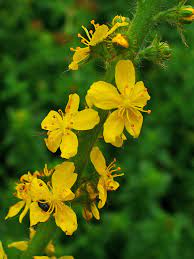Botanical Description:
Scientific Name: Hyssopus officinalis
Common Names: Hyssop
Description:
Hyssop is a perennial herb belonging to the Lamiaceae family, known for its aromatic leaves and spikes of colorful flowers. Native to Southern Europe, Western Asia, and the Middle East, hyssop has been valued for its culinary and medicinal uses. The aerial parts of the plant, including leaves and flowers, contain compounds that contribute to its potential therapeutic actions.
Disclaimer:
This Materia Medica is provided for informational purposes only and should not replace professional medical advice. Please consult with a qualified healthcare practitioner or herbalist before using any herbal remedies.
Therapeutic Actions:
- Antimicrobial:
- Hyssop exhibits antimicrobial properties, potentially beneficial for addressing infections.
- Expectorant:
- Recognized for its expectorant effects, aiding in the clearance of respiratory mucus.
- Anti-Inflammatory:
- Exhibits anti-inflammatory effects, contributing to its use in inflammatory conditions.
- Digestive Aid:
- Acts as a digestive aid, promoting digestion and reducing digestive discomfort.
Constituents:
- Essential Oil:
- Rich in essential oil containing compounds like pinocamphone and isopinocamphone.
- Flavonoids:
- Contribute to the plant’s potential therapeutic effects.
- Tannins:
- Astringent compounds with potential benefits for the digestive system.
Traditional Uses:
- Respiratory Health:
- Hyssop is traditionally used to support respiratory health, addressing conditions such as coughs and bronchitis.
- Digestive Aid:
- Employed as a digestive aid to enhance digestion and address indigestion.
- Topical Applications:
- Applied externally for its potential anti-inflammatory and soothing effects.
- Spiritual and Ritual Use:
- Used historically in spiritual and ritual practices for purification.
Dosage and Preparation:
- Hyssop Infusion:
- Infusions made from dried hyssop leaves and flowers. Dosage may vary, and it’s essential to follow recommended guidelines.
- Hyssop Tincture:
- Liquid extracts prepared with alcohol or glycerin. Dosage typically ranges from 30-60 drops, up to three times a day.
- Steam Inhalation:
- Inhaling steam with hyssop-infused water for respiratory support.
Cautions and Considerations:
- Pregnancy and Breastfeeding:
- Safety during pregnancy and breastfeeding is not well-established. Consultation with a healthcare professional is recommended.
- Allergies:
- Individuals with known allergies to hyssop or related plants should exercise caution.
- Epilepsy:
- Hyssop contains pinocamphone, which may trigger seizures in susceptible individuals. Caution is advised for those with epilepsy.
Conclusion:
Hyssop, with its aromatic leaves and historical significance, stands as a versatile herb in traditional medicine. From its antimicrobial and expectorant effects to its use in supporting digestion and addressing inflammation, hyssop provides a range of potential benefits. Whether taken as infusions, tinctures, or applied topically, it offers accessible options for those seeking natural remedies. However, caution is advised, especially during pregnancy or for individuals with specific health conditions. This Exhaustive Materia Medica aims to provide comprehensive insights into hyssop’s botanical description, therapeutic actions, constituents, traditional uses, dosage, precautions, and applications. For personalized guidance, consultation with healthcare professionals or herbalists is recommended, ensuring safe and effective utilization of hyssop as a herbal remedy.





